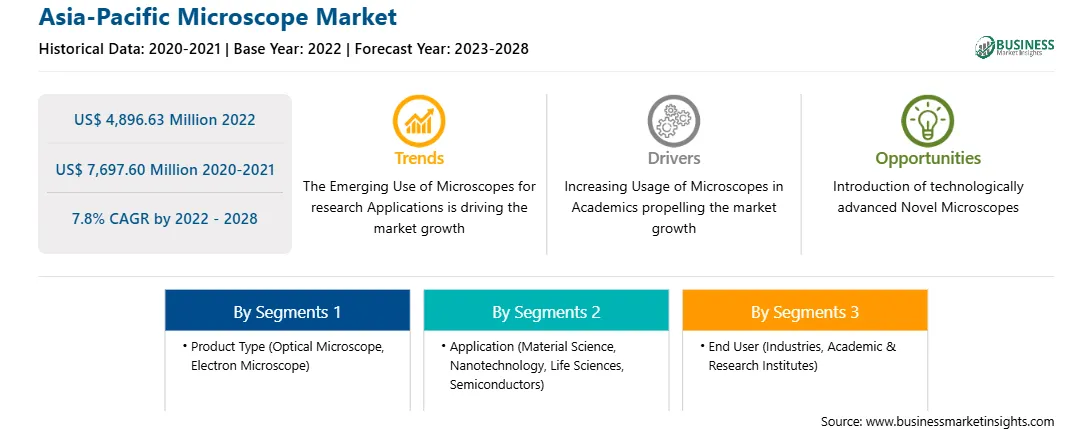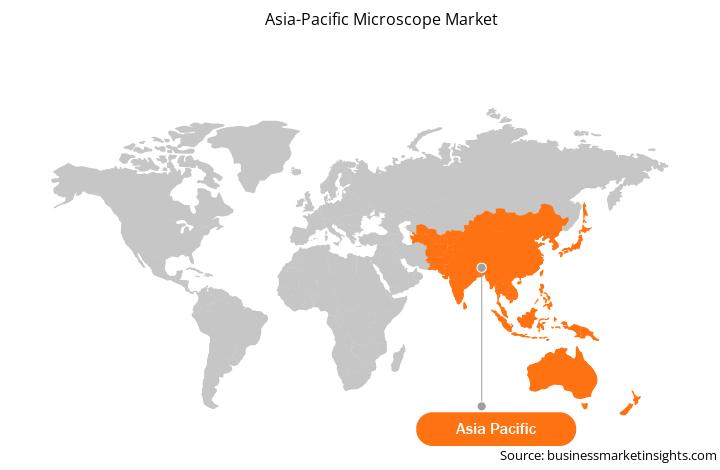High resolution, live-cell imaging, and digitalization are a few technological advancements in the microscope field. A few new enhanced microscopes include expansion microscopes, scanning helium microscopes, multi-view microscopes, and integrated microscopy workflows. Significant advances have been made in the field of neuroscience. For instance, in December 2020, a group of researchers at the Center for Molecular Spectroscopy and Dynamics within the Institute of Basic Science (IBS) in Seoul made a breakthrough in deep-tissue optical imaging. They developed an enhanced optical microscope that can form an image through intact mouse skull and acquire a microscopic map of neural networks in the brain tissues without losing spatial resolution. Researchers named it a reflection matrix microscope, which combines the powers of hardware and computational adaptive optics. In addition, the digital microscope, including LED screen instead of an eyepiece, is gaining traction in the market. In February 2021, ZEISS launched ZEISS Visioner 1, an innovative digital microscope enabling all-in-one focus in real-time. So, growing development of novel microscopes is expected to drive the Asia Pacific microscope market.
The Asia Pacific microscope market is segmented into Japan, China, India, South Korea, Australia, and the Rest of APAC. China dominated the market in 2022. With the growing advancements in microbiology and molecular science fields across China, the demand for high-end, super-resolution optical microscopes is also increasing as the country has become a large consumer of optical microscopes. However, high-end microscopes depend on imports, and the country had to import most of the core components for these powerful microscopes. Thus, the dependence on importing super-resolution optical microscopes and their key components is restricting the research in biological science in China. Although in December 2018, the project, "Development of Core Components and Systems of Super-Resolution Optical Microscopes," was completed at Suzhou Institute of Biomedical Engineering and Technology (SIBET), Chinese Academy of Sciences (CAS), and after five years of research, the SIBET scientists broke through the key technologies. In January 2019, scientists in China created super-resolution optical microscopes with a viewing range till 50nm, allowing scientists to observe subtle molecular processes within cells in real-time, potentially helping them develop new drugs. In addition, through the project implementation, SIBET has built a microscopic optical engineering platform, which will provide customized microscope equipment as per user’s needs. Additionally, the increasing usage of various microscopy techniques will support the market growth in the coming years. TEM has become a great analytical tool for materials science. Shanghai Institute of Ceramics, Chinese Academy of Sciences (SICCAS) was among the first several institutions in China that started to use TEMs in materials research, and the main work was to provide structural analysis services for the research groups in the institute and minorly for exterior institutions or companies. All these factors are likely to contribute to the rise in the adoption of the microscope in the coming years.
Strategic insights for the Asia-Pacific Microscope provides data-driven analysis of the industry landscape, including current trends, key players, and regional nuances. These insights offer actionable recommendations, enabling readers to differentiate themselves from competitors by identifying untapped segments or developing unique value propositions. Leveraging data analytics, these insights help industry players anticipate the market shifts, whether investors, manufacturers, or other stakeholders. A future-oriented perspective is essential, helping stakeholders anticipate market shifts and position themselves for long-term success in this dynamic region. Ultimately, effective strategic insights empower readers to make informed decisions that drive profitability and achieve their business objectives within the market.

| Report Attribute | Details |
|---|---|
| Market size in 2022 | US$ 4,896.63 Million |
| Market Size by 2028 | US$ 7,697.60 Million |
| Global CAGR (2022 - 2028) | 7.8% |
| Historical Data | 2020-2021 |
| Forecast period | 2023-2028 |
| Segments Covered |
By Product Type
|
| Regions and Countries Covered | Asia-Pacific
|
| Market leaders and key company profiles |
The geographic scope of the Asia-Pacific Microscope refers to the specific areas in which a business operates and competes. Understanding local distinctions, such as diverse consumer preferences (e.g., demand for specific plug types or battery backup durations), varying economic conditions, and regulatory environments, is crucial for tailoring strategies to specific markets. Businesses can expand their reach by identifying underserved areas or adapting their offerings to meet local demands. A clear market focus allows for more effective resource allocation, targeted marketing campaigns, and better positioning against local competitors, ultimately driving growth in those targeted areas.

The Asia Pacific microscope market is segmented based on product type, application, end user, and country.
Based on product type, the Asia Pacific microscope market is segmented into optical microscope, electron microscope, and other. The electron microscope segment held the largest market share in 2022. The optical microscope segment is further segmented into confocal microscope, stereo microscope, digital microscope, and others. Similarly, electron microscope segment is further bifurcated into scanning electron microscope and transmission microscope.
Based on application, the Asia Pacific microscope market is segmented into material science, nanotechnology, life sciences, semiconductors, and others. The life sciences segment held the largest market share in 2022.
Based on end user, the Asia Pacific microscope market is segmented into industries, academic & research institutes, and others. The industries segment held the largest market share in 2022.
Based on country, the Asia Pacific microscope market is segmented into China, India, Japan, South Korea, Australia, and the Rest of APAC. Further, China dominated the market in 2022.
Bruker Corporation; Carl Zeiss AG; COXEM Co., Ltd; Euromex Microscopen BV; Hitachi High-Tech Corporation; KLA Corporation; Leica Microsystems; Nikon Corporation; Olympus Corporation; and Thermo Fisher Scientific Inc. are the leading companies operating in the Asia Pacific microscope market.
The Asia-Pacific Microscope Market is valued at US$ 4,896.63 Million in 2022, it is projected to reach US$ 7,697.60 Million by 2028.
As per our report Asia-Pacific Microscope Market, the market size is valued at US$ 4,896.63 Million in 2022, projecting it to reach US$ 7,697.60 Million by 2028. This translates to a CAGR of approximately 7.8% during the forecast period.
The Asia-Pacific Microscope Market report typically cover these key segments-
The historic period, base year, and forecast period can vary slightly depending on the specific market research report. However, for the Asia-Pacific Microscope Market report:
The Asia-Pacific Microscope Market is populated by several key players, each contributing to its growth and innovation. Some of the major players include:
The Asia-Pacific Microscope Market report is valuable for diverse stakeholders, including:
Essentially, anyone involved in or considering involvement in the Asia-Pacific Microscope Market value chain can benefit from the information contained in a comprehensive market report.